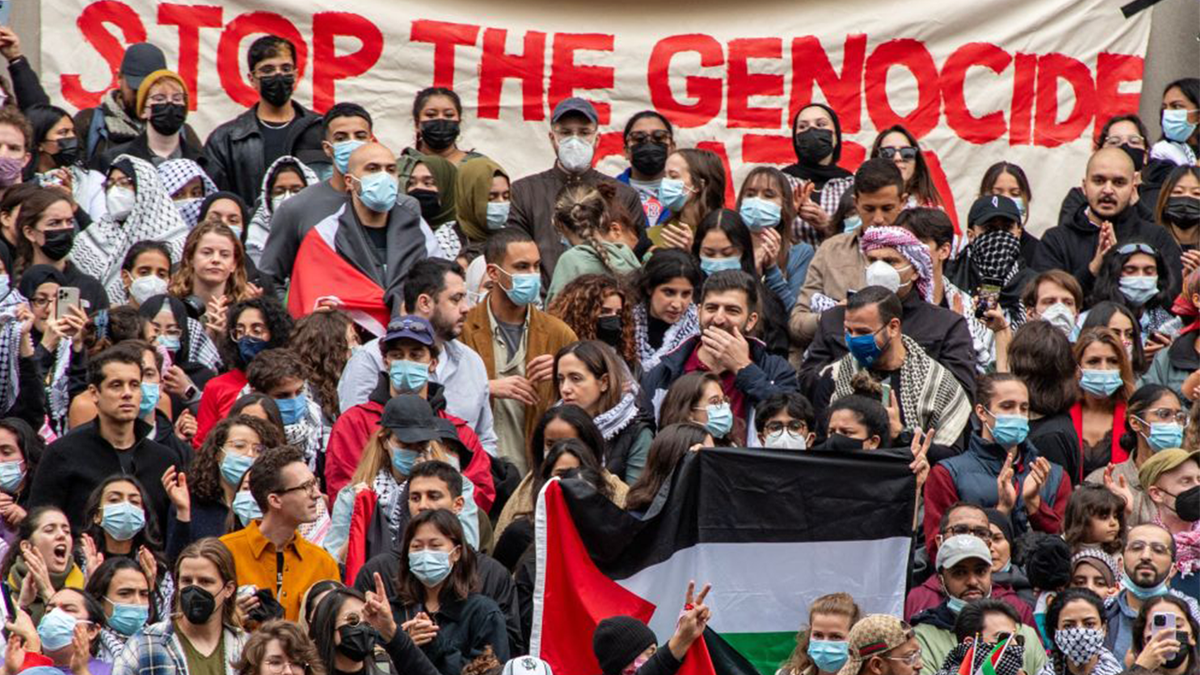‘Celebrating’ a massacre: Jewish students denounce anti-Israel protest
Pro-Israeli college students at the University of Massachusetts in Amherst said they were disgusted at the pro-Palestinian supporters' rhetoric at a protest.
Students in universities across the country are self-censoring at a time when their voices should not be silenced. I have received countless calls in the past week from students at scores of schools worried about Hamas and the fact that they cannot express their anger and sadness or even talk about Israel without worry of being attacked or canceled.
College students are afraid to ask questions, be open ethically and intellectually to professors and peers, and take risks for fear of being labeled or attacked. The tragedy unfolding in Israel highlights the depth of just how dangerous the environment has become on college campuses in terms of both physical safety and the search for truth.
University administrators must face this simple truth: there is no middle ground when discussing the indescribable terror attacks in Israel at the hands of Hamas; Hamas engaged in unprovoked and unprecedented evil in Israel.

Supporters of Palestinians gather for a rally at Harvard University in Cambridge, Massachusetts, on Oct. 14, 2023. (Joseph Prezioso/AFP via Getty Images)
Numerous governments, organizations and communities immediately condemned the attack, and polling data reveals the American public expresses deep sympathy for the Israeli people and broadly sees the Israeli government’s military response to Hamas’ attacks as justified. However, countless Jewish college and university students around the nation have been thrown into a state of shock and fear knowing that they cannot speak out.
COLLEGES TAUGHT MY GENERATION TO HATE AMERICA. ARE WE SURPRISED THAT THEY HATE ISRAEL TOO?
Weak statements condemning Hamas are now emerging from schools like Harvard, Penn and Northwestern, but they only surfaced after days of pressure. The liberal administrative machine and the anti-Israel climate on collegiate campuses has made it difficult and dangerous for students to dissent against the antisemitic notion that Israel is a colonizing, genocidal force.
Students are well aware that these statements do practically nothing to quell their fears that their schools do not support them, and may even punish them for speaking out. Students know that making a clear moral statement to condemn rapists, murderers and baby killers is almost impossible for them for the consequences can be severe and long-lasting.
Data from the Foundation for Individual Rights and Expression’s (FIRE) survey of over 55,000 student voices across the higher education world demonstrates the depth of this fear. Half of all students (50%) report that they self-censor occasionally or more often because of how students, a professor or the administration would respond on campus. Both men (50%) and women (50%) self-censor occasionally or more often and there is no racial gap.
The tension is palpable on campus. Students consider their reputations before sharing their opinions in class and a majority of students (56%) state that they worry about damaging their reputation based on their words and ideas. This is true across race, gender and school type.
Unsurprisingly, then, students feel immense pressure to avoid discussing controversial topics in classes. An astonishing 72% of all students assert that they feel at least some pressure to avoid talking about certain topics in class. This is a travesty for American higher education - classrooms are designed to be the very spaces where ideas are shared and debated and that is not happening today.
GOP CHAIRMAN FED UP WITH STUDENTS' ANTI-ISRAEL STANCE WANTS TO MAKE COLLEGES PAY: ‘DISGUSTED’
Comfortable majorities among genders, races and school types all share the same pressure to not speak in class. Fear and silence are universal and we are witnessing a hollowing out of our spaces of inquiry and curiosity.
Turning to Israel, most Jewish Americans have long-standing connections to Israel. The Pew Research Center found that 82% of Jews see Israel as an essential or important part of what being Jewish means to them. Majorities believe that they have a lot or something in common with Jews in Israel and that they are very or somewhat emotionally attached to Israel.
However, Israel is on the wrong side of history, according to collegiate administrations. Because of that, voicing or providing support after the Hamas massacre of over 1,000 Israelis is simply a non-starter.
The president of Sarah Lawrence refused to condemn Hamas when asked to do so. One student, while crying, said she was "terrified to be caught mourning because I'll be socially canceled." These are not occasional incidents; they are the new normal.
CLICK HERE FOR MORE FOX NEWS OPINION
Per the FIRE data, just a quarter of students on campus (26%) report that the Israeli/Palestinian conflict is an issue that is difficult to have an open and honest conversation about on campus. But, when Jewish students respond to the same question, the figure more than doubles, with 55% of Jewish students stating that they cannot have a vulnerable discussion about Israel on their campuses.
Although some students are pushing back against DEI offices that tolerate students advocating murdering others and glorifying the actions of Hamas, countless students are scared, remaining silent and despondent, and feeling helpless.
Students in schools all over the country walk through their campuses in a state of fear and the crisis in Israel brings this collegiate calamity into sharp focus.
CLICK HERE TO GET THE FOX NEWS APP
There is no ambiguity surrounding Hamas’ behavior in Israel and no student should feel unsupported and afraid to speak up here. But too many students are suffering in silence.
College and university administrators must be held accountable for the mess they made and schools must be reformed to promote open expression, freedom of inquiry and disagreement. Donors are already making significant demands and this just may be the beginning to end the wave of cancel culture that has silenced so many students.













































